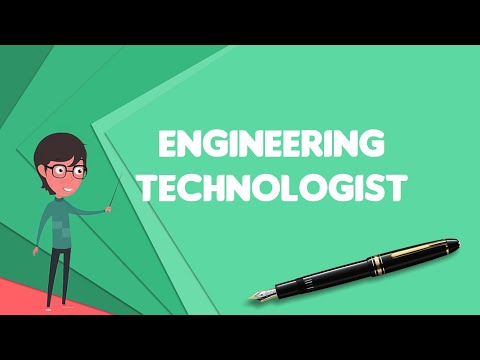High-Paying Engineering Technologist Jobs: Description & Salary

Engineering Technologist Job Description Template
Engineering Technologist is a professional who applies scientific and engineering principles to solve technical problems in various industries. They work closely with engineers and scientists to develop, test, and improve products, processes, and systems. The main responsibilities of an Engineering Technologist include designing, testing, modifying, and repairing equipment and systems. They also analyze data and create reports to assist in decision-making processes. Additionally, they may be involved in project management tasks such as budgeting and scheduling. Engineering Technologists often specialize in a specific field such as mechanical, electrical, civil, or industrial engineering. They may be employed in industries such as manufacturing, construction, telecommunications, or research and development. To excel in this role, an Engineering Technologist must have strong analytical and problem-solving skills. They should be able to think critically and apply their technical knowledge to develop innovative solutions. Additionally, they must have good communication skills to collaborate with engineers, scientists, and other professionals. In terms of education, most Engineering Technologists hold a bachelor’s degree in engineering technology or a related field. Some may also pursue professional certifications to enhance their skills and knowledge. Overall, Engineering Technologists play a crucial role in the development and improvement of various technologies and systems. They contribute to the advancement of industries by applying their technical expertise and problem-solving abilities.Engineering Technologist Responsibilities
Engineering Technologist Requirements
How Much Does A Engineering Technologist Make?
Engineering Technologist Salary
| Job Title | Salary Range |
|---|---|
| Engineering Technologist | $50,000 – $90,000 |
Engineering Technologists play a crucial role in various industries by applying their technical skills and knowledge to support engineering projects and operations. They are responsible for assisting engineers in designing, testing, and implementing new technologies, as well as troubleshooting and maintaining existing systems. The salary range for Engineering Technologists can vary depending on factors such as experience, education, location, and industry. On average, an Engineering Technologist can expect to earn between $50,000 and $90,000 per year. This range may increase with additional certifications or specialized skills.
Engineering Technologist Salaries by Country
Top Paying Countries for Engineering Technologist
| Country | Average Salary (USD) |
|---|---|
| United States | $79,000 |
| Switzerland | $76,000 |
| Australia | $70,000 |
| Germany | $68,000 |
| Canada | $66,000 |
An engineering technologist is a professional who specializes in the implementation and application of engineering principles. They work closely with engineers to design and develop various systems and products. Salaries for engineering technologists vary significantly depending on the country they work in. The top paying countries for engineering technologists include the United States, Switzerland, Australia, Germany, and Canada. These countries offer higher average salaries compared to others, providing attractive opportunities for engineering technologists seeking competitive compensation.
A video on the topic Engineering Technologist
Video Source : AudioversityInterview Questions for Engineering Technologist
1. What is the role of an Engineering Technologist?
An Engineering Technologist is responsible for applying engineering principles and technical skills to assist in the design, development, and implementation of engineering projects.
2. What qualifications and skills are required to become an Engineering Technologist?
To become an Engineering Technologist, one typically needs a bachelor’s degree in engineering technology or a related field. Strong analytical, problem-solving, and communication skills are also important for this role.
3. What are the main job responsibilities of an Engineering Technologist?
An Engineering Technologist’s main job responsibilities include assisting in the design and development of engineering projects, conducting experiments and tests, analyzing data, preparing technical reports, and ensuring compliance with safety and regulatory standards.
4. How do Engineering Technologists differ from Engineers?
While both Engineering Technologists and Engineers work in the field of engineering, Technologists typically focus more on the practical application of engineering principles, whereas Engineers are involved in the theoretical and conceptual aspects of engineering.
5. Can you provide an example of a project that you have worked on as an Engineering Technologist?
As an Engineering Technologist, I have worked on a project involving the design and implementation of a renewable energy system for a commercial building. My role included conducting feasibility studies, performing energy audits, and assisting in the installation and testing of solar panels and wind turbines.
6. How do you stay updated with the latest advancements in engineering technology?
I stay updated with the latest advancements in engineering technology by regularly attending conferences, workshops, and seminars. I also make use of online resources, such as technical journals and industry publications, to stay informed about emerging trends and technologies.
7. How do you ensure compliance with safety regulations in your work?
To ensure compliance with safety regulations, I closely follow industry standards and guidelines when designing and implementing engineering projects. I also conduct thorough risk assessments and perform regular inspections to identify and address potential safety hazards.
8. How do you handle conflicts or disagreements within a project team?
When conflicts or disagreements arise within a project team, I believe in open and transparent communication. I actively listen to different perspectives, encourage collaboration, and work towards finding a mutually beneficial solution. If necessary, I involve a mediator or project manager to help resolve the conflict.
9. Can you describe a time when you encountered a challenging engineering problem and how you resolved it?
During a previous project, we encountered a complex engineering problem related to the structural integrity of a building. To resolve it, I conducted extensive research, consulted with experts in the field, and used advanced simulation software to analyze the problem. Through a combination of innovative solutions and collaborative problem-solving, we were able to address the issue successfully.
10. How do you prioritize and manage multiple tasks and deadlines?
To prioritize and manage multiple tasks and deadlines, I utilize project management tools and techniques. I create a detailed schedule, break down tasks into smaller, manageable steps, allocate resources effectively, and regularly monitor progress. I also communicate with stakeholders to ensure clarity and alignment on project priorities.






